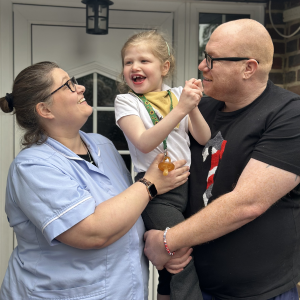Ask the experts: Looking after your feet
 They can be the most neglected part of our body, but our feet are our often our gateway to independence. We caught up with Wendy Winpenny, Interim Quality Lead and Professional Lead for Podiatry to find out how and why some TLC for tootsies is key …
They can be the most neglected part of our body, but our feet are our often our gateway to independence. We caught up with Wendy Winpenny, Interim Quality Lead and Professional Lead for Podiatry to find out how and why some TLC for tootsies is key …
Why should you look after your feet?
A good foot care routine is essential to help reduce the risk of infection or injury to your feet, including fungal infections, corns, calluses and wounds to your feet.
If you have reduced sensation in your feet, this can increase a risk of falling over and affect the way you walk.
Some long-term conditions, like diabetes, high blood pressure, high cholesterol and smoking can mean increased risk of foot problems.
Discomfort and pain are warning signs of problems with our health, this also includes what you may feel with your feet, like an injury, damaged skin or infection.
How can you look after your feet at home?
There are some easy steps you can at home to help care for your feet:
- wash your feet every day in warm, soapy water
- dry your feet carefully, especially between the toes, using your own towel
- use a moisturising cream to soften the skin and avoid putting this cream between your toes
- keep your nails at a comfortable length – use nail scissors or clippers and gently cut your nails and use a file to remove any sharp edges
- change your socks, tights or stockings daily
- wear different shoes every other day – shoes can absorb a lot of moisture from your feet and need time to dry out.
Unsuitable or bad fitting footwear can be the cause of many foot problems. It’s important to make sure shoes and slippers fit properly. Badly fitting shoes can rub and cause injuries, corns or hard skin.
Shoes should be well-fitting, supportive and ideally flat heeled.
If you can, check your feet daily. Look for breaks in the skin, blisters, change in skin colour or signs of infection, like swelling, redness, heat or pain. If you have difficulty doing this yourself, ask a relative, friend or carer to help. If you do notice anything that concerns you, please contact your GP.
What can podiatry services help you with?
KCHFT’s Podiatry Service takes referrals for adults and children with podiatric problems who have complex medical conditions, which put the lower limb at higher risk of complications.
It can help people who have nail problems, such as ingrowing toe nails and nail deformities, corns and calluses. It can also help with foot and toe deformities, such as bunions, hammer toes, heel pain and problems with your foot and toe joints.
The team treat people who have complications of diabetes, peripheral vascular disease and types of arthritis.
You can access the Podiatry Service if you meet the following criterial:
- high-risk health condition, such as diabetes, rheumatoid arthritis, neurological conditions and/or circulatory problems and at risk of developing ulcers
- minor surgery for ingrowing toe nails
- lower-limb musculoskeletal conditions, for example plantar fasciitis, heel pain or tendon pain.
Referrals are accepted from a healthcare professional or GP. If you are registered with a GP in Thanet or the south Kent coast area, you can self-refer.
Share this article on social media







